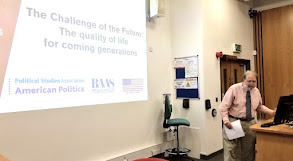My remarks pointed out that America's youth are troubled by an array of issues that they see clouding their future quality of life. These issues range from fear of climate catastrophe to concerns over the impact of artificial intelligence to daunting levels of personal and public debt.
For example, fully 7 in 10 young Americans (aged 16-25) are worried about the climate; a majority think artificial intelligence will lead to fewer jobs; and just 10% of Americans under 45 think Social Security and Medicare will be there for them when they retire.
These sources of anxiety are exacerbated by the serious political and social divisions in the United States. There is very little "middle ground" in America today—and the extremes are locked into their respective media silos. These divisions are not conducive to compromise or consensus or optimism. This has predictably led to a plummeting faith in America's institutions.
Thus, America's youth are caught in a web of uncertainty about their future. They are burdened by what they see as the stark realities of the present. But these coming generations are also more politically and socially active than their predecessors. Perhaps facing these challenges will allow them to create a future with the potential for more optimism.

